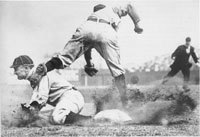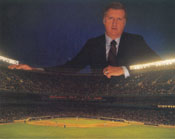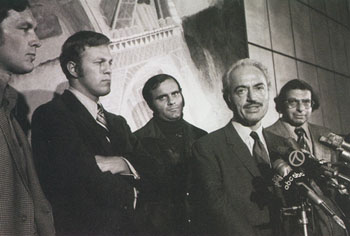 Historian John Thorn wrote, "fundamentally, baseball is what America is not, but has longed or imagined itself to be"1 -- a typically romantic sentiment glossing over both the game's past and present. We think of baseball as a rural game, yet it was born in Mahattan, the very epitome of urbanism. We think of a game of noble heroes, not drunken pawns of gamblers. We think of players, not profiteering owners. We think of leisurely pace and a pastime inherently democratic and fair, not King Kelly's rule-bending and a sport Ty Cobb called "something like a war."2 Somehow, even Cobb is apotheotized as a sort of noble Ahab.
Historian John Thorn wrote, "fundamentally, baseball is what America is not, but has longed or imagined itself to be"1 -- a typically romantic sentiment glossing over both the game's past and present. We think of baseball as a rural game, yet it was born in Mahattan, the very epitome of urbanism. We think of a game of noble heroes, not drunken pawns of gamblers. We think of players, not profiteering owners. We think of leisurely pace and a pastime inherently democratic and fair, not King Kelly's rule-bending and a sport Ty Cobb called "something like a war."2 Somehow, even Cobb is apotheotized as a sort of noble Ahab.
 In truth, baseball was very much what America was in the Gilded Age, and perhaps not what it imagined itself to be. Investors sought profits at the expense of labor. Players wanted higher pay and greater job security. The relationship between the person and the world was changing from a direct to a more mediated experience, and the role of sport was no different. The professionalitzation of the game was disorienting to the many demanding it maintain its amateur, gentlemanly origins. Yet, people paid for it, and after years of capitalistic agon, the National League had emerged as the last man standing in 1892. It would face one final hurdle, cleared by conciliation, in the emergence of the American League in 1899. However, by this time baseball was profitable -- the owners had won out over the players, and would maintain a stranglehold over labor until the death of the reserve clause in 1975.
In truth, baseball was very much what America was in the Gilded Age, and perhaps not what it imagined itself to be. Investors sought profits at the expense of labor. Players wanted higher pay and greater job security. The relationship between the person and the world was changing from a direct to a more mediated experience, and the role of sport was no different. The professionalitzation of the game was disorienting to the many demanding it maintain its amateur, gentlemanly origins. Yet, people paid for it, and after years of capitalistic agon, the National League had emerged as the last man standing in 1892. It would face one final hurdle, cleared by conciliation, in the emergence of the American League in 1899. However, by this time baseball was profitable -- the owners had won out over the players, and would maintain a stranglehold over labor until the death of the reserve clause in 1975.
1 Geoffrey C. Ward, Baseball: An Illustrated History (New York: Knopf, 1994) 58.
2 Ward 82.
 Unimagined Baseball
Unimagined Baseball
 Unimagined Baseball
Unimagined Baseball
